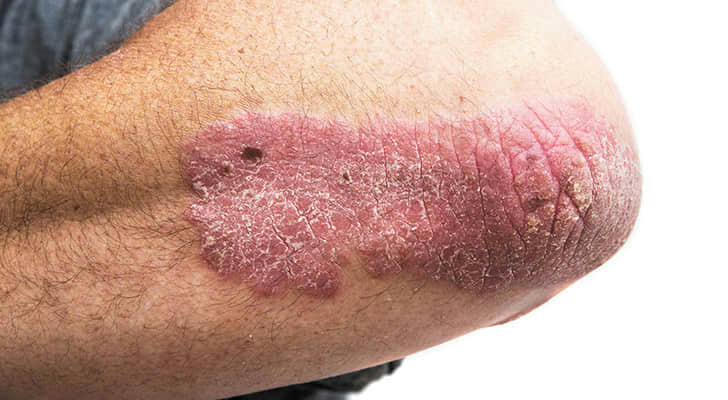What You Must Understand About Psoriasis
Psoriasis can mess with your skin, making it dry, scaly, and itchy. No cure for it yet, but you can handle it with lifestyle tweaks and meds. Keeping track of what sets it off can also help.
When you've got psoriasis, your skin's cells go into overdrive, piling up fast on the surface. That buildup causes redness and inflammation around those silvery scales. On darker skin tones, these scales might look more purplish or dark brown, sometimes cracking and bleeding.
Normally, your skin cells take about a month to grow from deep down to the surface before they fall off. With psoriasis, though, this whole process speeds up to just a few days. That speedy growth means the cells don't have time to shed properly, leaving you with that telltale psoriasis buildup.
A recent study spilled the beans that around 7.5 million grown-ups (3% of the whole population) in the U.S. have psoriasis. It hits different races and ethnicities in different ways: about 3.6% of white folks, 3.1% of non-Hispanic and mixed-race folks, 2.5% of Asians, 1.9% of Hispanics and Mexican Americans, and 1.5% of Black folks are dealing with it.

Where does psoriasis usually show up first?
• Well, it often starts with those telltale scales on joints like elbows and knees. But hey, don't be shocked if it shows up anywhere else—hands, feet, neck, scalp, face—you name it. There are even rarer types that can affect nails, your mouth, and even down there.
• Psoriasis often hangs out with other buddies like type 2 diabetes, inflammatory bowel disease, heart issues, psoriatic arthritis, anxiety, and depression.
• Pustular psoriasis: More common in adults, it leads to white, pus-filled blisters and red or violet inflamed skin patches.
• Inverse psoriasis: It causes bright red, shiny, inflamed skin patches in skin folds like under the arms, breasts, groin, and genitals.
• Erythrodermic psoriasis: This severe and rare type can cover large areas of the body, resembling sunburn with large shedding scales. It requires immediate medical attention due to its potential seriousness.
What are the symptoms of psoriasis?
They can range from a few flakes on the scalp or elbow to covering a large portion of the body. Common symptoms of plaque psoriasis include raised, red patches on light skin or brown/purple patches on darker skin, along with scales, dry skin, soreness, itching, burning, and sometimes painful, swollen joints.
Not everyone experiences all these symptoms, especially with less common types of psoriasis. Each person's experience can be unique, so it's essential to work closely with healthcare professionals to manage symptoms effectively.
How to identify psoriasis?
Psoriasis often comes and goes in cycles. You might have strong symptoms for a few days or weeks, and then they could fade away almost completely. However, it can flare up again later, especially if something triggers it. Sometimes, psoriasis symptoms can vanish completely for a while. When you're not showing any signs of the condition, doctors call it "remission." But this doesn't mean psoriasis won't come back; it just means you're symptom-free for a period.

How do you prevent psoriasis from spreading?
It's crucial to know that psoriasis isn't contagious. You can't catch it from someone else by touching their skin. Many people mistakenly think it's contagious, so it's important to be informed about the condition.
What causes psoriasis to start?
Doctors are still figuring out the exact causes of psoriasis. But they believe two main factors play a role: genetics and the immune system.
Training programs funded by the Department of Labor usually offer a variety of learning methods, including online courses and hybrid learning modes, allowing trainees to arrange their learning time flexibly. This is very convenient for learners who need to balance work, family and other responsibilities [source: U.S. Department of Labor, ETA].
Immune system
Psoriasis is an autoimmune disease. This means your immune system mistakenly attacks healthy skin cells. Normally, white blood cells are supposed to fight off infections, but in psoriasis, they attack your skin cells instead. This leads to a rapid production of new skin cells, causing them to build up on the skin's surface. This buildup forms the plaques and red, inflamed areas typical of psoriasis.
Genetics
Some people inherit genes that make them more likely to develop psoriasis. If someone in your immediate family has psoriasis, your risk increases. Research shows that genetics can play a significant role in who gets psoriasis.
Diagnosing psoriasis
To diagnose psoriasis, your doctor may use two main methods:
Physical examination
Most doctors can diagnose psoriasis with a simple physical exam. The symptoms of psoriasis are usually distinct and different from other skin conditions that might look similar. During the exam, it's important to show your doctor all the areas where you have concerns. Also, let them know if anyone else in your family has psoriasis.
Biopsy
If your symptoms are unclear or your doctor wants to confirm the diagnosis, they may perform a biopsy. During this procedure, a small sample of your skin is taken and sent to a lab for analysis under a microscope. This helps determine the type of psoriasis you have and rules out other possible skin disorders or infections. Biopsies are typically done in your doctor's office, and they often use a local numbing medicine to make the procedure more comfortable. Once the results are ready, your doctor will discuss them with you and recommend treatment options.
What are the triggers of psoriasis?
Psoriasis can come and go in cycles. You might have strong symptoms for a while, and then they can fade away. But sometimes, they come back if something triggers them. Your triggers may not be the same as someone else's, and they might even change over time.
The most common triggers for psoriasis include:
Stress
High stress levels can sometimes bring on a psoriasis flare-up. Learning to manage stress better could help reduce how often flare-ups happen.
Alcohol
Drinking too much alcohol can trigger psoriasis outbreaks more often. Cutting back on alcohol or stopping may not only help your skin but also benefit your overall health. Your doctor can help you figure out the best plan for managing your alcohol use.
Injury
Injuries like cuts, scrapes, or sunburns can also trigger psoriasis flare-ups. Even injections or vaccines might cause a new outbreak.
Medications
Certain medicines can trigger psoriasis or make it worse. These can include medications like lithium, some used for malaria, or even certain drugs for high blood pressure.
Infection
When your body fights off an infection, like strep throat, it can sometimes trigger psoriasis. This happens because your immune system gets confused and attacks healthy skin cells as well.
How do you prevent psoriasis from spreading?
It's important to know that psoriasis isn't contagious. You can't catch it from someone else, even if you touch their psoriatic skin. Many people think it's contagious, but that's a myth.

Psoriasis Facts and Figures
Sure, here's a chill rewrite of those psoriasis facts:
"In the U.S., about 7.5 million adults aged 20 and up deal with psoriasis.
Psoriasis can start at any age, but most folks get diagnosed as adults, usually between 15 and 35.
Research from Dermnet NZ suggests the risk of developing psoriasis peaks from ages 16–22 and 50–60.
According to the WHO, psoriasis affects both guys and girls equally. It's more common in white folks but might be less recognized in darker skin tones.
Having a family member with psoriasis can increase your risk, though some people get it without any family history, and not everyone with a family history gets it.
Around a third of people with psoriasis also end up with psoriatic arthritis. Plus, psoriasis can increase the chances of other conditions like type 2 diabetes, kidney disease, heart disease, and high blood pressure.
In Summary, psoriasis is a skin condition caused by an immune system issue. The most common type is plaque psoriasis, which leads to silvery, scaly patches that may itch. Other types of psoriasis can appear differently.
Currently, there's no cure for psoriasis, but various home remedies and medical treatments can help manage its symptoms.
